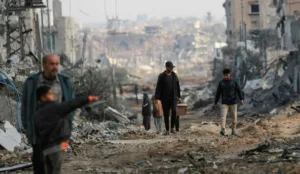Haaretz Will Not Be Silenced by Netanyahu

Palestinians walk next to damaged buildings after Israeli forces withdrew, in Nuseirat, central Gaza Strip, on Friday.Credit: Abd Elhkeem Khaled/Reuters
“Wake up, it’s war,” said Amos Harel, our military analyst, calling me early on October 7, 2023. It was Simhat Torah, the last of the High Holy Days, the unofficial end of the Tel Aviv summer, and after staying out late the night before, I slept through the rocket attack sirens that went off at 6:29 A.M. “What war, against whom?” I wondered, still dizzy. “It’s Hamas,” said Harel as he laid out in crisp detail what would happen now: a long fight, aggressive Israeli counteroffensive, strong international criticism.
War was already in the air for several months as Israeli society was torn apart by Prime Minister Benjamin Netanyahu’s plan to radically overhaul the constitutional order and turn the country’s shaky democracy into an autocratic theocracy. His critics inside and outside the government warned that the internal rift would tempt Israel’s enemies to attack, and so did the intelligence community. At Haaretz, we argued that Netanyahu’s policy of oppressing the Palestinians into submission would lead to disaster, and that the next surprise attack might be around the corner. Netanyahu wouldn’t listen.
But when our doom and gloom prophecies materialized on October 7, we were nonetheless shocked and grieved by what happened. Hamas’ unthinkable success in invading Israel and killing, kidnapping, raping and looting in the border communities and military outposts while the Israel Defense Forces failed to respond in time was beyond belief. And so were the cries for help from colleagues and friends hiding in their safe rooms from Hamas killers who had already murdered their neighbors or taken them captive into the Gaza Strip.
Our reporters, rushing to the scene, barely escaped the shooting, helped collect bodies from the massacre at the Nova music festival, or struggled to rescue their loved ones from the attackers. Other staff members, who grew up in the kibbutzim along the Gaza border, lost family members, friends and neighbors in the massacre; grief-stricken as they were, they found themselves caring for their elderly parents who survived the onslaught and were subsequently evacuated from their homes. Over a dozen writers and editors had to report to their military reserve units.
We have never faced such an emotional and professional challenge in the newsroom. But despite the unprecedented difficulty, we had to stand by and fulfill our journalistic mission to report the broadest possible story about the war.
More …
